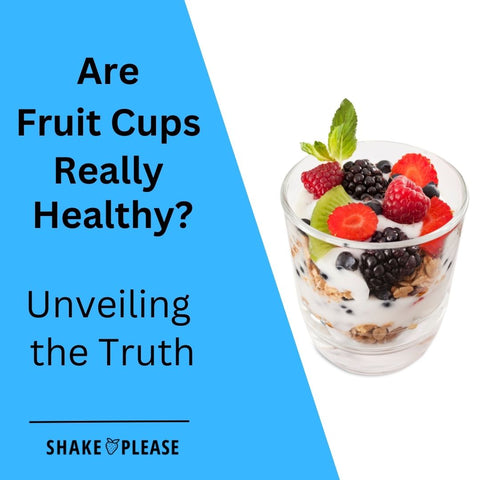
Fruit cups have become a popular snack option, often marketed as a healthy and convenient way to satisfy your sweet tooth.
However, the truth about their nutritional value and overall healthiness may surprise you.
In this article, we'll dive deep into the world of fruit cups, exploring their benefits, drawbacks, and viable alternatives to help you make informed choices for your well-being.
Nutritional Value of Fruit Cups
Fruit cups can vary greatly in their nutritional content, depending on the specific fruits used and the added ingredients.
While they may contain a decent amount of vitamins, minerals, and fiber from the fruit, many commercial fruit cups also include added sugars, syrups, or preservatives that can diminish their overall nutritional value.
-
Fruit Content: The primary ingredient in a fruit cup should be, well, fruit. However, some manufacturers may use a smaller proportion of actual fruit and supplement it with added sugars or artificial flavors to enhance the sweetness.
-
Nutrient Density: The nutritional density of a fruit cup can vary depending on the types of fruit used. For example, a fruit cup containing a mix of berries, citrus fruits, and melon may offer a more diverse array of vitamins, minerals, and antioxidants compared to a cup containing primarily apples or pears.
-
Added Sugars and Syrups: Many fruit cups come packaged in a sugary syrup or juice, which can significantly increase the overall sugar content. Consuming too much added sugar can lead to a range of health issues, including weight gain, type 2 diabetes, and heart disease.
Benefits of Consuming Fruit Cups
Despite the potential drawbacks, fruit cups can still provide some health benefits when consumed in moderation and as part of a balanced diet.
-
Convenient Fruit Intake: Fruit cups offer a quick and easy way to incorporate more fruit into your daily routine, especially for those with busy lifestyles or limited access to fresh produce.
-
Hydration: The juices or syrups in fruit cups can help contribute to your overall fluid intake, which is essential for maintaining proper hydration levels.
-
Nutrient Variety: Depending on the fruit selection, fruit cups can provide a variety of essential vitamins, minerals, and antioxidants that support overall health and well-being.
How to Choose a Healthy Fruit Cup
When selecting a fruit cup, it's essential to read the nutrition label and ingredient list carefully to ensure you're making a healthier choice.
-
Minimal Added Sugars: Look for fruit cups that contain no added sugars or syrups, or have a low amount of added sweeteners.
-
Whole Fruit Ingredients: Opt for fruit cups that list whole fruits as the primary ingredients, rather than fruit juices or concentrates.
-
Variety of Fruits: Choose fruit cups that offer a diverse selection of fruits, as this can provide a broader range of nutrients.
-
Portion Size: Be mindful of the serving size and consider how the fruit cup fits into your overall daily caloric and nutrient intake.
Factors that Affect the Healthiness of Fruit Cups
Several factors can influence the overall healthiness of a fruit cup, including the processing methods, packaging, and storage conditions.
-
Processing Methods: Fruit cups that are minimally processed, such as those that are packed in water or their own juices, tend to be healthier than those that undergo extensive processing with added sugars, preservatives, or other additives.
-
Packaging: The type of packaging used can also impact the nutrient retention and shelf life of the fruit cup. For example, fruit cups in glass jars may better preserve the nutrients compared to those in cans or plastic containers.
-
Storage Conditions: Proper storage, such as refrigeration, can help maintain the freshness and nutritional value of the fruit in a fruit cup.
Alternatives to Fruit Cups - Exploring Frozen Fruit Smoothies
While fruit cups can provide a convenient way to consume fruit, there are other options that may offer more nutritional benefits. One alternative worth considering is frozen fruit smoothies.
-
Nutrient Density: Frozen fruit smoothies can be made with a wider variety of fruits and vegetables, allowing for a more nutrient-dense beverage compared to a typical fruit cup.
-
Customization: Homemade or freshly blended smoothies allow you to control the ingredients (such as adding protein powder) ensuring that you're getting the nutrients you desire without added sugars or preservatives.
-
Fiber and Satiety: Blending whole fruits and vegetables into a smoothie retains the fiber content, which can help promote feelings of fullness and support digestive health.
Nutritional Comparison Between Fruit Cups and Frozen Fruit Smoothies
To better understand the differences between fruit cups and frozen fruit smoothies, let's examine a side-by-side comparison of their nutritional profiles:
| Nutrient | Fruit Cup (1 cup) | Frozen Fruit Smoothie (1 cup) |
|---|---|---|
| Calories | 100-150 | 150-250 |
| Total Carbohydrates | 25-35g | 30-40g |
| Sugars | 20-30g | 20-30g |
| Fiber | 2-4g | 4-8g |
| Protein | 0-2g | 2-5g |
| Vitamin C | 20-50% DV | 50-100% DV |
| Potassium | 5-10% DV | 10-20% DV |
As this table shows, frozen fruit smoothies can provide a more nutrient-dense option, with higher fiber, protein, and vitamin content compared to many commercially available fruit cups.
Tips for Making Healthy Choices When Consuming Fruit Cups
To maximize the health benefits of fruit cups, consider the following tips:
-
Read Labels Carefully: Scrutinize the nutrition facts and ingredient list to identify added sugars, preservatives, and other potentially concerning additives.
-
Choose Whole Fruit Over Fruit Juices: Opt for fruit cups that contain whole fruit pieces rather than fruit juices or concentrates, as the former typically have more fiber and less added sugar.
-
Portion Control: Be mindful of the serving size and avoid consuming the entire fruit cup in one sitting, as this can lead to an excess of calories and sugar.
-
Complement with Other Healthy Foods: Pair your fruit cup with a source of protein, such as Greek yogurt or a handful of nuts, to create a more balanced snack or meal.
-
Consider Homemade Alternatives: If possible, make your own fruit cups at home using fresh, whole fruits and minimal added sweeteners.
The Secret to Refreshing Smoothies with Frozen Fruit
Common Misconceptions About Fruit Cups
Despite their popularity, there are several misconceptions about the healthiness of fruit cups that are important to address:
-
All Fruit Cups Are Healthy: As we've discussed, the nutritional value of fruit cups can vary greatly, and some may contain high amounts of added sugars or other less-than-ideal ingredients.
-
Fruit Cups Are a Substitute for Fresh Fruit: While fruit cups can provide a convenient way to consume fruit, they should not be seen as a direct replacement for fresh, whole fruits, which offer a more comprehensive nutrient profile.
-
Fruit Cups Are Low in Calories: The calorie content of fruit cups can be deceiving, as the added sugars and syrups can significantly increase the overall caloric value.
Fruit Cups and Their Popularity
Fruit cups have become a staple in many households, offering a quick and portable way to enjoy a sweet and refreshing snack.
Their convenience and perceived healthiness have contributed to their widespread popularity, but it's essential to understand the nuances of their nutritional value to make informed choices.
How Many Calories Are in a Cup of Mixed Fruit?
Conclusion - The Verdict on the Healthiness of Fruit Cups
In conclusion, the healthiness of fruit cups is a complex and multifaceted topic.
While they can provide a convenient way to incorporate more fruit into your diet, the nutritional quality of fruit cups can vary greatly depending on the specific ingredients and processing methods used.
To ensure you're making the healthiest choices, it's crucial to read labels carefully, prioritize fruit cups with minimal added sugars and preservatives, and consider alternatives like homemade fruit smoothies that offer a more nutrient-dense and customizable option.
Remember, the key to a balanced and healthy diet is to focus on a variety of whole, unprocessed foods, including fresh fruits and vegetables.
By making informed choices and incorporating a range of nutritious options, you can enjoy the benefits of fruit while maintaining your overall well-being.





